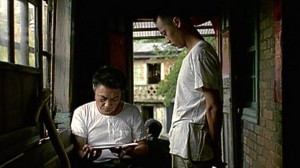What is the relevance of a film festival from a neighboring Asian country like Taiwan, amid mounting tension in the West Philippine Sea?
In times of crisis, cultural exchanges are all the more imperative, according to Wellington Wei, director of the press division of the Taipei Economic and Cultural Office.
Wei explained that “cultural diplomacy, through film festivals, art exhibits and sports meets,” can help bring nations together—smoothening out differences and fostering understanding amid strife.
Conduit
Now on its third year, the Taiwan Film Festival will be held at the Shangri-La Plaza mall starting today until Aug. 6.
Also ongoing this month, the Argentine Cinema Exhibition (2012) presents a varied selection of recent productions and classics. (See schedule below.)
This year, Wei said, the Taiwan festival screens eight films—four features by internationally acclaimed director Hou Hsiao-Hsien and four documentaries that reflect the past, present and future of Taiwan.
“The film fest is a great opportunity for us to be a conduit for cultural understanding and exchange through cinema,” said Lala Fojas, executive vice president and general manager of Shangri-La Plaza.
Taiwan’s best
Wei explained that organizers chose to highlight the works of Hou simply because he’s one of Taiwan’s best filmmakers.
“Before Ang Lee became famous, there was Hsiao-Hsien,” he noted.
In an earlier Inquirer interview, world-renowned filmmaker Olivier Assayas singled out Hou as one of the most important filmmakers in Asia.
Featured in the fest are some of Hou’s most awarded feature films: “The Boys from Fengkuei,” “A Time to Live, A Time to Die,” “Dust in the Wind,” and “Three Times,” plus the docu “Grandma’s Hairpin.”
“The Boys from Fengkuei” won the Golden Montgolfiere honor in Nantes (France) in 1984. “A Time to Live” won the Fipresci prize in Berlin in 1986, the best non-American/non-European film in Rotterdam in 1987 and the special jury prize in the Torino International Festival for Young Cinema in 1986.
“Dust in the Wind” won the Kinema Junpo award for best foreign language film director in 1990.
“Three Times” brought home the best Taiwanese film, filmmaker and actress trophies from the Golden Horse Awards. It was nominated at the Hong Kong Film Awards and was an entry in Cannes in 2005.
“Everyone in Taiwan knows Hsiao-Hsien,” Wei explained. “His films depict everyday life. He tells stories that can happen to everyone.”
He also commended the “spatial” quality of Hou’s works. “That’s his style. He prefers long takes and he’s able to put everything within a single frame.”
Four docus
The four documentaries are Wu Shwu-Mey’s “Classmates,” Hou’s “Grandma’s Hairpin,” Hsu Ming-Chun’s “Stars” and Lin Yu-Hsien’s “The Man Who Plants Trees.”
“I appreciate docus more than feature films,” Wei said. “Docus present reality. These can help viewers understand life better in Taiwan.”
“Classmates” tells the story of students in a special-education school, while “Grandma’s Hairpin” focuses on Nationalist soldiers separated from their families in mainland China.
“Stars” tackles the journey of contestants on the reality show “One Million Star,” while “The Man Who Plants Trees” chronicles one dreamer’s environmental crusade.
Wei hopes to gather the films of an older generation of Taiwanese filmmakers (Li Han Xiang, Li Xing, Hu Jin Quan and Bai Jing Ruei) in future editions of the festival.
“Their films are mostly martial arts, costume epics. They are very learned and their films can teach us a lot about history,” he said.
Call 6337851.
Argentine pride
The Argentine Cinema Exhibition opened yesterday at the Instituto Cervantes in Ermita, Manila. There are five remaining screenings.
“Carancho” (Pablo Trapero, 2010), Aug. 4,
2 p.m.:
A love story between an unscrupulous lawyer (Ricardo Darín) and a young medical doctor (Martina Gusman), the film is set against the backdrop of a murky weave of interests behind traffic accidents in Argentina.
“Aballay, el hombre sin miedo” (Fernando Spiner, 2010), Aug. 11,
2 p.m.:
In northern Argentina, a violent and ruthless gaucho (cowboy) has a revealing experience that makes him conscious of his own savagery. This leads him to abandon his life of crime in a process that will turn him into a legend.
“Cortázar” (Tristán Bauer, 1994), Aug. 18,
2 p.m.:
This is a documentary film portraying the life of renowned Argentine writer Julio Cortázar through interviews with the author and recreations of some of his most celebrated stories.
“Camila” (María Luisa Bemberg, 1984),
Aug. 25, 2 p.m.:
In 1840s Buenos Aires a beautiful young socialite named Camila (Susú Pecoraro) and a Jesuit priest (Imanol Arias) fall in love and start an impossible romance in times of prejudice and moralistic pressures.
“La deuda interna” (Miguel Pereira, 1988);
Aug. 30, 6 p.m.:
In Chorcán, Jujuy, a young aboriginal meets a rural teacher, who just arrived from distant Buenos Aires. Among themselves a fraternal friendship will develop only to be interrupted when the youngster is drafted to combat in the Malvinas Islands.
Call 5261482.
(bayanisandiego
@hotmail.com)


